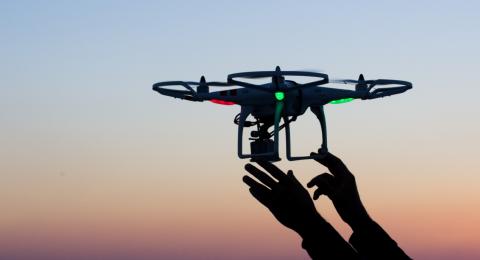Part 107 Drone (UAV/UAS) Pilot Test Prep Workshop
This workshop helps prepares students to pass the FAA Part 107 Remote Pilot Aeronautical Knowledge test. It provides in-depth training on the FAA’s Part 107 non-hobbyist small Unmanned Aircraft Systems (sUAS) rules and regulations, as well as all other knowledge areas of aviation required by the FAA, to become a certified Part 107 Remote Pilot and to operate a drone commercially in the United States National Airspace System.
This workshop is designed for hobbyist drone pilots, and others working in industry and law enforcement required to fly drones, who are looking to become FAA Part 107 Remote Pilots, so that they can fly drones commercially and safely in the United States National Airspace System. The workshop is in direct alignment with the FAA’s Part 107 remote pilot certification requirements and includes the latest regulation changes.
By the end of the workshop students will be well on their way to being fully prepared to successfully pass the FAA Remote Pilot Aeronautical Knowledge Test.
In addition to in-depth training on the Part 107 FAA rules and regulations, students will be introduced to the various sUAS-related careers paths that become available to them after receiving their FAA Part 107 Remote Pilot Certificate
Topics covered in detailed during this Part 107 Remote Pilot Workshop include:
- Part 107 Remote Pilot Certification Requirements
- Part 107 Aeronautical Knowledge Test General Information
- Scheduling to take the Part 107 Remote Pilot Aeronautical Knowledge Exam
- Application Process for Obtaining a Part 107 Remote Pilot Certificate
- Applicable FAA Documents and Regulations Associated with sUAS
- New Part 107 Rules – Effective April 21, 2021
- Airspace classification, ops requirements and flight restrictions affecting sUAS ops
- Aviation weather sources
- Effects of weather on sUAS performance
- sUAS loading
- Emergency procedures
- Crew Resource Management
- Radio Communication Procedures
- Determining the Performance of sUAS
- Physiological effects on Pilot Performance
- Aeronautical Decision-Making and Judgment
- Airport Operations
- Night Operations
- Maintenance and Pre-flight Inspection Procedures
- Practice test questions are introduced at the end of each workshop chapter.
Note that students can also prepare for the Part 107 exam using the FAA-approved study guide and various Part 107 certificate test prep applications. To sign up to take the FAA test, visit the FAA website to learn more about certification requirements and to find a Knowledge Testing Center in your area.
|
Tue Apr 21, 2026
|
|
|
9:00AM - 3:30PM
|
|
|
Portsmouth - Hybrid (in-person or live online)
|
|
|
Mark Donovan
|
|
|
225.00
Workshop Fee
|
|
| 6 | |
|
USNH Tuition Benefit
10% Alumni Discount UNH-Alum
Military Discount
R and I Discount
10% KSC Alumni Discount
|
|
| 0.6 | |
| PDT-LSurvUas-03 | |
| 226008 |
Emphasis Topics covered in the Part 107 Remote Pilot Workshop Include:
How to Read Sectional Charts
There’s a wealth of information on an FAA Sectional Chart that can ensure you fly your drone safely and avoid manned aircraft. This Part 107 remote pilot workshop provides detailed discussion on interpreting them.
National Airspace System
Our nation’s airspace is comprised of controlled and uncontrolled airspace, as well as special use and “other” airspace. Knowing where you can legally fly a drone is important for a remote pilot. This workshop provides in-depth discussion on this topic.
Part 107 Rules
- Remote ID
- Flying Drones over people
- Flying Drones over vehicles
- Night Operations
- Recurrent Training
- Inspection/Testing Compliance
- Design & Production
Aviation Weather
Up to 16% of the Remote Pilot Aeronautical Written Exam can be on weather. This workshop provides in-depth review on:
- All available weather resources
- How to read and interpret aviation weather charts
- How to interpret METARs, TAFs and PIREPs
- How weather (temp and pressure) impacts drone performance

